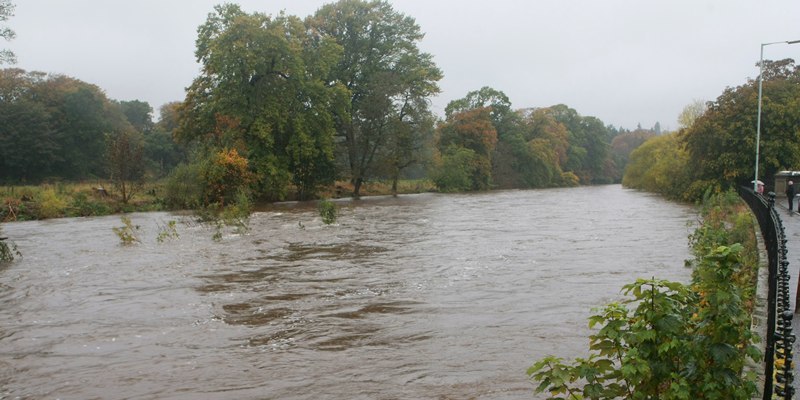The owners of a Brechin caravan park have hit out at Angus Council plans for a flood prevention scheme which they say will have a severe impact on their business.
George Murray and family, who have operated the East Mill Road caravan site for almost 50 years, say they will be seeking compensation if the local authority persists with the £14 million plan which includes building an earthen levee along the site perimeter as protection from the flood-prone South Esk river.
They say the proposals would impose a severe long-term financial penalty on the viability of the caravan site through loss of annual recurring revenue, loss of residential and static caravan plots, relocation of existing units resulting in a further loss of the touring caravan area which in turn would affect the individual viability of the toilet and shower block.
Mr Murray said, “Any government sanction of the council’s flood prevention option will blight the stability of our site from the outset and we would intend to seek early discussions on compensation terms, relocation of existing tenants and infrastructure alterations that would be required for those that choose to remain.
“Disruption to the site during any proposed works is another factor that would require extensive discussions. We will strongly object to any major construction disruption being proposed.
“The proposal the council appears to favour will reduce the area of the site and leave no room to retain sufficient income. Any changes to the site layout would also have to take into account tighter regulations imposed by the council, which would again reduce the capacity of the site.
“We remain concerned that as well as the loss of revenue, the capital loss for the site will be substantial and could well equate to a seven-figure valuation. Additionally the reduction in capacity of the site will have a knock-on effect for the economics of Brechin in general, with a reduced footfall in terms of both permanent residents and tourists.”
The family has an alternative plan for protecting the site which they say they are going to proceed with although they stress that in their 50-year occupation of the site the river bank has never been breached by flood water.
Mr Murray said, “We consider that our own outlined plans for a concrete wall, utilising precast units set along the foot of the present embankment, can be achieved at a minute fraction of the cost of the council proposals, while providing an equivalent protection to flooding from the river.”
Where they absolutely agree with the council is on the need for alterations to the mains drainage systems and they believe this should be treated as a priority.
They had warned the council and Scottish Water that they would hold them both responsible for any damage and costs incurred in dealing with the after-effects of flooding caused by the inadequacies in the sewerage infrastructure but both denied that responsibility.
The council has ruled out dredging the river with officers, arguing it would cost too much, have minimal benefits and have a devastating impact on rare freshwater species, principally because of the presence of pearl mussels. However, the cost of removing the gravel bank had been estimated at around £60,000 maximum.
Mr Murray blames the constraints imposed by the Scottish Environment Protection Agency (SEPA) and Scottish Natural Heritage (SNH) for preventing what he argues would be the simplest, most cost-effective option.
He said, “It is utterly despicable that these unelected and overstaffed quangos of SEPA, along with political posturing from Europe and Holyrood, can insist on such farcical adherence to the protection of fish and mussels, in preference to just getting on with the work needed to protect the general public as well as commercial interests.
“We cannot continue with prolonged discussions and will instigate our own works in stages, unless we can be persuaded of longer-term benefits.
“We have an ongoing programme of improvements for the site that have been substantially delayed as a result of the council’s long and protracted investigations. We cannot delay indefinitely and are probably losing trade to other sites in Angus which do not have to contend with such drawbacks.
“We have a business to run and the need to safeguard our clients and customers, and the viability of our site, is paramount.”
